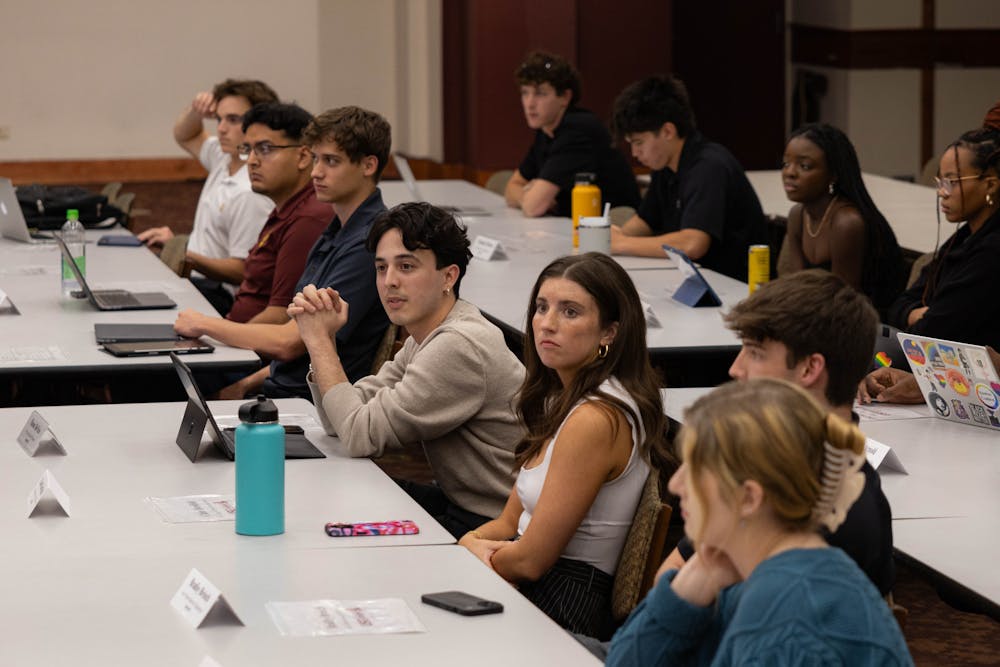A USG senator wrote legislation regarding the current election cycle, which has already started. It would revise the election code and would change the rules for campaigning on election day.
Mason DoVico, the USG-Tempe Senator who authored the legislation and a junior studying political science and business, attempted to pass legislation in a USG-T senate meeting on Feb. 27, but it will have to go through ASASU procedures.
If approved, the revised code could change the rules of the election process during this year's campaign season. These changes would also come 23 days into the election cycle for the 2024-25 year.
DoVico said making these changes to the election code has the "possibility of setting a bad precedent," but said he believes they could also be beneficial.
"I do believe, however, in some cases, these changes would be beneficial not only for all of those running but for the election department and all of ASU students in general," DoVico said.
He removed the original legislation from the agenda at the beginning of the meeting, only for the Senate to add other legislation — composed of similar and additional propositions – with a different name. That similar legislation with a different name was presented by Alex Arnold, a USG-T senator and a junior studying construction management and technology.
DoVico then motioned to cancel the vote for the legislation presented by Arnold after a five minute recess to rename it and include other student government entities under the ASASU umbrella, like GPSA.
READ MORE: ASU student organizations denounce student activities bill in state legislature
This legislation — which USG-T attempted to pass at the end of the meeting — has the same name as the original proposal DoVico struck from the agenda at the beginning of the meeting.
The motion was meant to take into account the future decisions of other student bodies to vote on the legislation since the new unified election code is universal to all of ASASU.
Tuesday's legislation went through several whirlwind private ballots during the voting process. The first private ballot was for the voting of the original legislation one was to undo the first round of voting, and the last was to vote on the renamed legislation.
The senate typically passes actions through acclamation instead of this specific private voting process, according to Michael Kintscher, GPSA parliamentarian and a Ph.D. student in computer science.
The proposed changes to the elections code included the ability to campaign during both the campaigning period and the voting period, which is against the original elections code. Meaning campaigning could have happened on voting day.
"Encouraging civic engagement on voting days (is) allowed," Morgann Kelly, the USG-T student body president and a senior studying global studies, said. "Can you run around campus and say vote for me? No. Can you run around campus and say vote? Yes."
Kintscher said this provision of how elections are currently run prevents student candidates for USG from standing outside on-campus housing and intercepting people to ask for their vote. Kintscher later expressed their concerns with the legislation's passage to the senate in an email detailing the process and complications with its original vote. The revision of the code will not immediately go to other student bodies at ASU.
They said the legislation will have to go through another two votes. The first vote will suspend the current rules and will have to pass by a two-thirds majority in all bodies of the ASASU student government.
The second vote was the vote on the legislation itself, which USG-T attempted to pass at the meeting, but it can only be approved with the suspension of the current rules, making the decision invalid, according to the email from Kintscher to USG.
READ MORE: GPSA passed BDS reform, boycotts several international businesses
Kelly said USG "had the opportunity to make these changes." According to Kelly, ASASU started working on elections code revisions in July 2023, which were finalized and shown to the public in December 2023.
The ASASU elections process started on Feb. 5, 2024, when candidate applications opened. Kintscher said revisions to the legislation would have a 30-day lockout if meant to alter the election code for the 2023-2024 academic year. The deadline to alter the code was anytime before Jan. 6, 2024, meaning the attempted revisions technically fall past the lockout date.
"It's now February 2024," Kelly said at the USG-T meeting in response to the attempt at late changes to the elections code.
Another proposed change was the exception of campaigning in all on-campus dining halls while preventing campaigning in on-campus housing. This includes but is not limited to residence halls, apartments and the Greek Leadership Village.
Gordon Commons, student housing for undergraduate students on the Downtown Phoenix campus, has a dining hall on its first floor, standing right below 12 floors of residence hall, meaning that the proposed change would complicate the elections code in certain situations. Tooker House in Tempe also has a dining hall on the lower floor of a residence hall, among others across the four ASU campuses.
"Something that I encourage you to ask yourself is 'Can the election proceed without these changes being made?' I think yes," Kelly said.
Edited by Grey Gartin, Alysa Horton and Shane Brennan
Editor's note: DoVico's year was updated from sophomore to the correct year as a junior and clarified his role in Arnold's legislation at 9:34 a.m. on Feb. 29, 2024. This story may be updated.
Reach the reporter at gheadle@asu.edu and @George_Headley7 on X.
Like The State Press on Facebook and follow @statepress on X
George Headley is a managing editor at the State Press and a third-year student at the Walter Cronkite School for Journalism and Mass Communication. He has previously worked as the politics desk editor and as a community and culture reporter. He has formerly worked with other organizations, such as KJZZ, the Reynolds Center for Business Journalism, and the Howard Center for Investigative Journalism.




